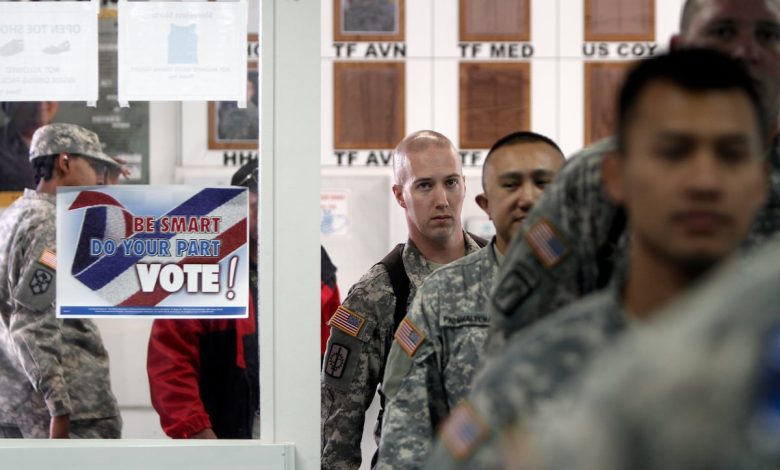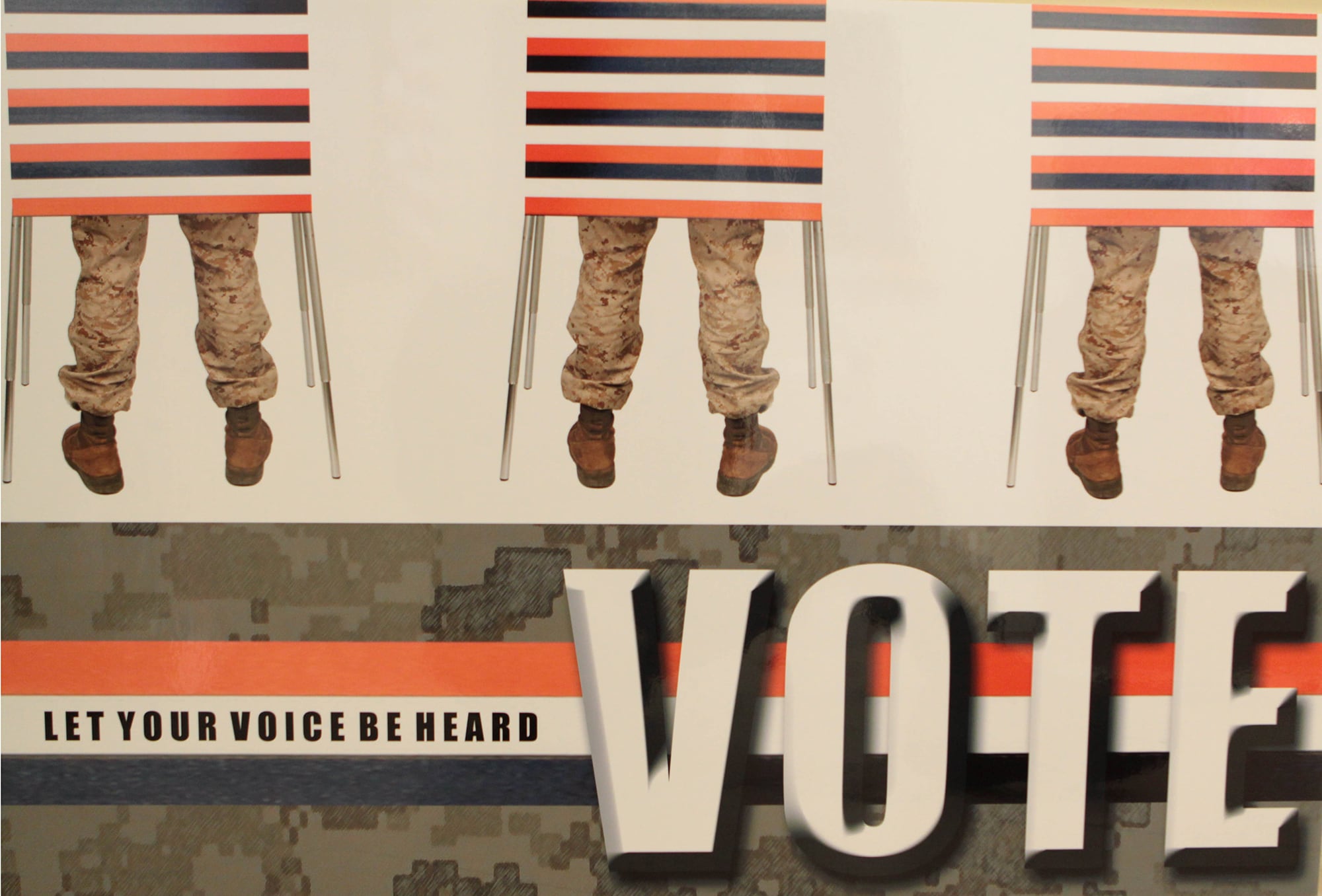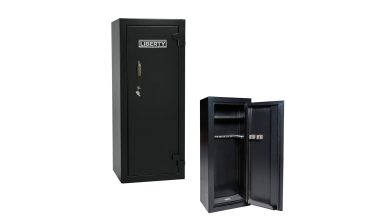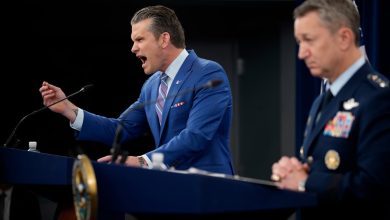Military families challenge Trump’s stricter federal voting rules

A military family organization joined a lawsuit challenging the constitutionality of President Donald Trump’s executive order imposing stricter voting requirements, arguing it would add barriers for troops and families who vote by absentee ballot.
And advocates say there are other ongoing efforts at the state level and in Congress that could also undermine the ability of service members and families, as well as overseas citizens, to vote absentee.
The executive order shortens absentee ballot receipt deadlines and requires documentary proof of citizenship, which military families say would disproportionately affect their ability to vote. It’s already logistically difficult to vote for some troops and families, especially given the frequency of military moves and deployments to remote locations.
The biggest effect on military voter participation is likely the new ballot return deadline, said Sarah Streyder, a military wife living overseas who serves as the executive director of the Secure Families Initiative. The executive order, issued March 25, requires absentee ballots to be received by Election Day.
The Secure Families Initiative is a plaintiff — along with United Latin American Citizens and Arizona Students’ Association — in the lawsuit filed March 31 against a number of administration officials. Related cases have been filed by the League of Women Voters Education Fund, the Democratic National Committee and others.
Trump’s executive order instructs the Attorney General to take action against states that count “validly cast absentee or mail-in ballots lawfully cast by Election Day but received after Election Day,” according to the lawsuit, which was filed in federal court for the District of Columbia.
States and Congress determine election rules. A number of states allow their local election officials to count absentee ballots from military and overseas citizen voters for a certain amount of days after Election Day. But 33 states do require absentee and mail-in ballots to be returned on or before Election Day, according to the National Conference of State Legislatures.
Absentee voters often have to deal with mail delays, and the requirement that ballots be received by Election Day “is going in the opposite direction of where we want it to go,” Streyder said. “We want a uniform, across-the board expansion of that timeline.”
The president’s order, she said, “erases a state’s ability to have ballots continue to arrive and be counted.”
“We consider it a gold standard across all 50 states for absentee ballots to continue to arrive up to seven days after Election Day and be counted, as long as they are postmarked by Election Day,” Streyder added.
She noted that the late arrival was the top reason military ballots were rejected by local election officials in the 2020 election.
RELATED
The Secure Families Initiative decided to join the lawsuit out of concern for military voters.
“We want to make very clear we’re not doing this because of partisan reasons,” Streyder said, noting that the effort is an extension of their ongoing work to advocate for military voters. “We are a highly mobile voter, affected by delays and changing requirements, all of which are out of our control.”
Trump’s order, titled “Preserving and Protecting the Integrity of American Elections,” notes that federal law establishes a uniform Election Day for federal elections.
“It is the policy of my Administration to enforce those statutes and require that votes be cast and received by the election date established in law,” the order states.
Among other things, the lawsuit challenging the order asks the court for a preliminary injunction and other action to prevent the Justice Department from taking any steps that would prohibit the counting of mail-in and absentee ballots that are “validly cast under state law.”
There is confusion about some of the provisions of the executive order as they apply to military voters and U.S. citizens overseas, Streyder said. While it appears to provide an exemption in one section related to military and overseas citizen voters, it’s not clear in other sections, the lawsuit alleges.
Military absentee voters, whether they’re voting from overseas or another location within the U.S. when they’re away from their voting residence, have certain protections under existing federal law.
The Uniformed and Overseas Citizens Absentee Voting Act, commonly referred to as UOCAVA, applies to military members and their family members who are away from their voting residence, as well as U.S. citizens living overseas. Among other things, UOCAVA requires states to transmit absentee ballots to UOCAVA voters who have requested them no later than 45 days before a federal election.
The executive order’s narrow protection for UOCAVA ballots — to the extent that it exists — wouldn’t apply to all military and overseas citizen voters because many don’t use the UOCAVA processes to cast absentee ballots and wouldn’t be protected by any carveout, the lawsuit alleges.
Some military voters use the Federal Post Card Application to request absentee ballots, which makes apparent their UOCAVA status. However, a number of troops and families don’t use the FPCA to request their ballots from their local elections offices and wouldn’t be protected.
RELATED

In addition, the new requirement for “documentary proof of United States citizenship” can create unnecessary barriers for military voters, Streyder said. The executive order imposes narrow documentation parameters. Those living overseas may not have the necessary documentation readily available, even though they are clearly eligible to vote.
“States already have secure eligibility and verification processes,” and the executive order simply adds barriers, she said.
One of the documents the executive order cites as proof of eligibility is “an official military identification card that indicates the applicant is a citizen of the United States.” But current military IDs don’t include that information.
It’s also unclear whether birth certificates would be sufficient documentation, whether the documentation would have to be presented in person, and whether proof of eligibility would need to be produced each time a voter asks for a Federal Post Card Application. The executive order mandates the Defense Department to update the FPCA to require proof of citizenship.
If the documentation requirement is put into effect, it would “seriously undermine the ease of use of the FPCA, which many of these voters use to register or request ballots, and already includes a citizenship attestation,” said Susan Dzieduszycka-Suinat, president and CEO of the U.S. Vote Foundation. For example, she said, voters living abroad would have to find a way to make a copy of their passport and attach it to the FPCA.
“Sending personal ID documents around in post or online also carries with it a serious risk of identity theft,” Dzieduszycka-Suinat said. “To our knowledge, to this date, there is not one single known case of actual UOCAVA voter fraud by a UOCAVA voter.”
The government responded to the preliminary injunction this week, saying “it is telling” that none of the plaintiffs in these cases are individually named voters who claim they would be affected if the court doesn’t intervene. They also argued the organizations involved in the lawsuit haven’t identified by name any voters they say they represent.
In addition, the government states, the plaintiffs couldn’t point to any actions to implement the executive order that have caused harm.
The plaintiffs, including the military family organization, filed a response Wednesday, noting they had learned the executive director of the Election Assistance Commission had written to the states to begin implementing the executive order.
Karen has covered military families, quality of life and consumer issues for Military Times for more than 30 years, and is co-author of a chapter on media coverage of military families in the book “A Battle Plan for Supporting Military Families.” She previously worked for newspapers in Guam, Norfolk, Jacksonville, Fla., and Athens, Ga.
Read the full article here







